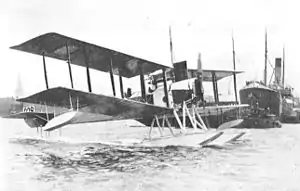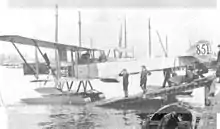Sopwith Type 860
The Sopwith Admiralty Type 860 was a 1910s British biplane seaplane torpedo bomber designed and built for the Admiralty by the Sopwith Aviation Company.
| Sopwith Type 860 | |
|---|---|
 | |
| Type 860 No.938 at Woolston, Southampton | |
| Role | Torpedo bomber seaplane |
| Manufacturer | Sopwith Aviation Company |
| First flight | 1914 |
| Introduction | 1915 |
| Retired | 1916 |
| Primary user | Royal Naval Air Service |
| Number built | 22 |
Design and development
First flown in December 1914 the Type 860 was an unswept biplane. The upper wings had a strut braced extension and ailerons were fitted on all four wings. It had twin strut-mounted floats under the fuselage and a float mounted under the tail and each wingtip. Some models were powered by a nose-mounted 200 hp 14-cylinder engine; others used a 225 hp (168 kW) Sunbeam Mohawk engine. Both models utilised a two-bladed propeller. It had two tandem open cockpits and could carry one 810 lb (367 kg) torpedo under the fuselage. The Sopwith Admiralty Seaplane Type 860 was built in two versions. The standard version had wings of equal span; the second version had a lower wing of shorter span. In both versions, the wings were designed to fold. The type remained in service with RNAS until at least 1916.[1]

Specifications
General characteristics
- Crew: 2
- Wingspan: 62 ft 11 in (19.18 m)
- Wing area: 790 sq ft (73.4 m2)
- Powerplant: 1 × Salmson 2M7 water-cooled piston engine, 220 hp (160 kW) or 225 hp Sunbeam Mohawk
- Propellers: 2-bladed
Armament
1 x 810 lb (370 kg) 14 inch Whitehead Mk. IX aerial torpedo
See also
Related lists
References
- Roots In The Sky – A History of British Aerospace Aircraft, Oliver Tapper (1980), ISBN 061700323 8; p. 20
| Wikimedia Commons has media related to Sopwith Type 860. |
- Taylor, Michael J. H. (1989). Jane's Encyclopedia of Aviation. London: Studio Editions.
- The Illustrated Encyclopedia of Aircraft (Part Work 1982–1985). Orbis Publishing. p. 2940.
- Sopwith 860 – British Aircraft Directory